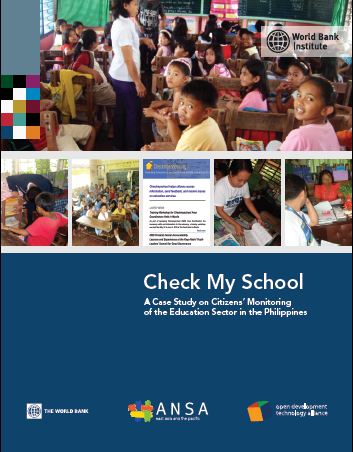Check My School (CMS) is a community monitoring project that aims to promote transparency and social accountability in the Philippine education sector by tracking the provision of services in public schools. The project uses a blended approach, which combines on-the-ground community monitoring with the use of information and communication technology (ICT). CMS had been initiated and designed by the Affiliated Network for Social Accountability in East Asia and the Pacific (ANSA-EAP) and jointly supported by the World Bank Institute and the Open Society Institute.
This
sheds light on the design and implementation features of the first pilot cycle of CMS in public schools across the Philippines. The case study discusses the general political background and operating environment of the CMS project, its concept and operating principles, the roles and incentives of the major stakeholders involved in its design and implementation, and the ways in which CMS aims to use ICTs. In addition,the case study provides a step-by-step analysis of the first CMS project cycle in 2011, examines its accomplishments and challenges, and provides lessons from the first pilot year of the project’s operation. The case study concludes with recommendations for projects that aim to follow the footsteps of CMS.
The major lessons from the first year of CMS’s operation are as follows:
- Constructive engagement leads to a cooperative relationship with government. The CMS project started with the signing of a memorandum of agreement (MoA) between ANSA-EAP and the Philippine Department of Education (DepEd). As part of the MoA, DepEd fully endorsed CMS, committing to share with ANSA-EAP all its available data on public schools and to help it establish relations with schools. This cooperation, especially with key government champions, has been one of the most important and promising features of CMS.
- Organized presence on the ground is critical. The mobilization of networks of committed and diligent “infomediaries” and volunteers—through the affiliation of ANSA-EAP with the Ateneo School of Government and its own networks—allowed CMS to effectively tap into local networks of civil society organizations, youth groups, and socially active individuals. The strong social mobilization efforts were supported by capacity-building and training activities to provide participating stakeholders with valuable knowledge and leadership skills and help infomediaries conduct validation activities.
- Complementarity with ongoing government projects creates an environment conducive to initiatives. The CMS project fits well within the current sociopolitical environment in the Philippines. DepEd’s efforts to implement large-scale decentralization reform in the country, coupled with pressure on school administrators to actively engage community stakeholders in their school’s management, have created a favorable environment for community monitoring initiatives such as CMS.
- Innovative ICT-enabled projects are an investment in the future of community monitoring. Although CMS was primarily envisioned as an online platform, its online presence during the first pilot year was relatively limited because of a variety of challenges inside and outside the project scope. ANSA-EAP’s flexibility and approach of iterative self-assessment and experimentation with different ICT tools (for example, using Facebook if problems arise with the main website) are promising. CMS has been working on a new website to improve this situation, and time will show the effectiveness and functionality of the new platform.
Download the Checkmyschool: A Case Study on Citizens’ Monitoring of the Education Sector in the Philippines

